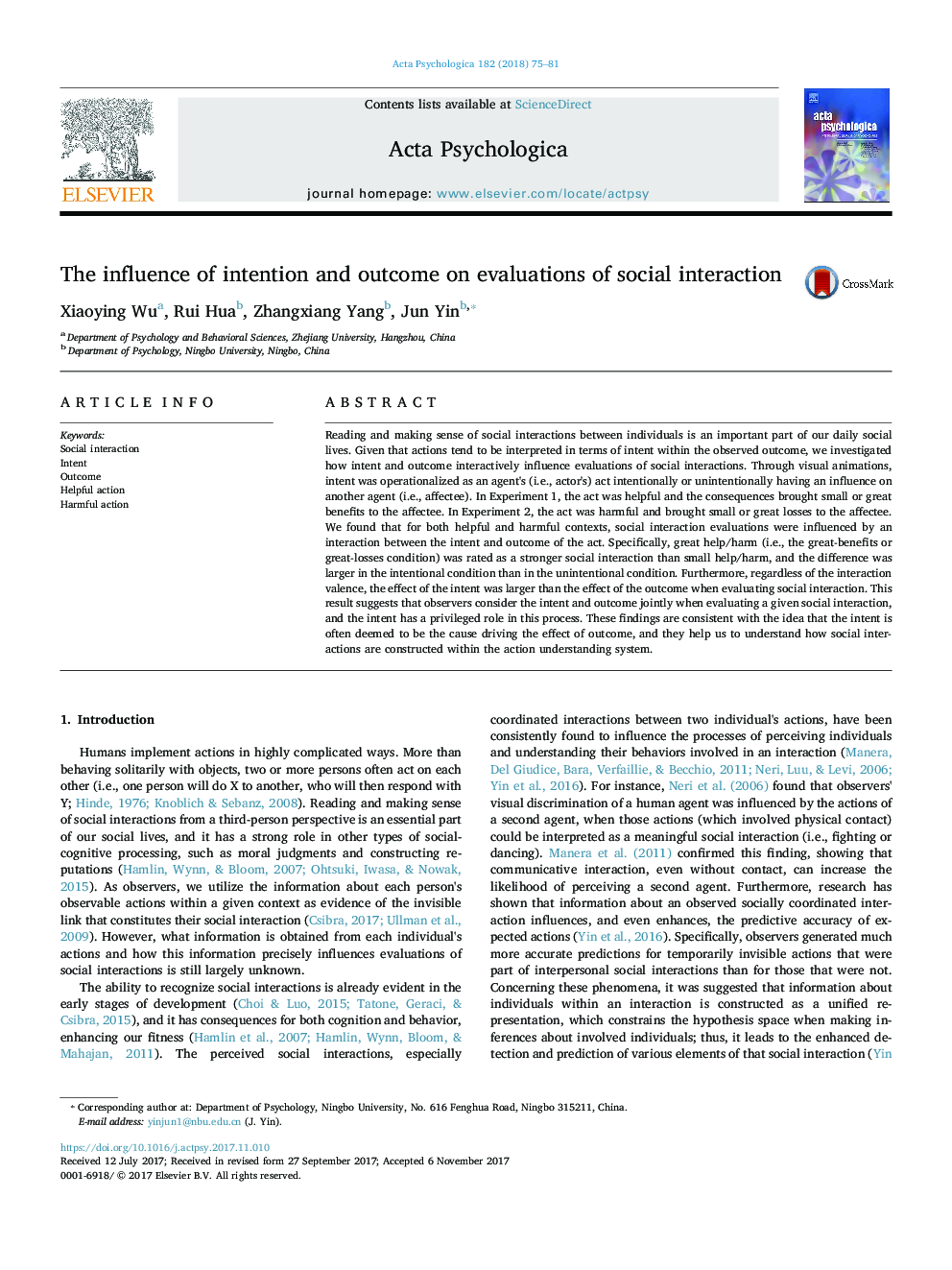| کد مقاله | کد نشریه | سال انتشار | مقاله انگلیسی | نسخه تمام متن |
|---|---|---|---|---|
| 7276877 | 1473576 | 2018 | 7 صفحه PDF | دانلود رایگان |
عنوان انگلیسی مقاله ISI
The influence of intention and outcome on evaluations of social interaction
ترجمه فارسی عنوان
تأثیر قصد و نتیجه بر ارزیابی تعامل اجتماعی
دانلود مقاله + سفارش ترجمه
دانلود مقاله ISI انگلیسی
رایگان برای ایرانیان
کلمات کلیدی
تعامل اجتماعی، قصد نتیجه اقدام مفید اقدام مضر،
ترجمه چکیده
خواندن و احساس تعاملات اجتماعی میان افراد بخش مهمی از زندگی اجتماعی روزانه ما است. با توجه به این که اقدامات تمایل به تفسیر در نظر گرفته شده در نتیجه مشاهده شده، ما بررسی کردیم که چگونه قصد و نتیجه در تعامل با ارزیابی تعاملات اجتماعی تاثیر می گذارد. از طریق انیمیشن های ویدئویی، قصد به عنوان یک عامل (به عنوان مثال، بازیگر) عمل عمدا یا ناخواسته تاثیر می گذارد در عامل دیگری (به عنوان مثال، اعمال). در آزمایش 1، این عمل مفید بود و پیامدهای مزایای کوچک یا عظیمی را برای عاملین به ارمغان آورد. در آزمایش 2، این عمل مضر بود و خسارات کوچک یا بزرگ را به عاملان وارد آورد. ما دریافتیم که برای هر دو زمینه مفید و مضر، ارزیابی تعاملات اجتماعی تحت تأثیر تعامل بین قصد و نتیجه عمل قرار گرفت. به طور خاص، کمک بزرگ / آسیب (به عنوان مثال، مزایای بزرگ یا مزایای بزرگ) به عنوان یک تعامل اجتماعی قوی تر نسبت به کمک کوچک / آسیب دیده، و تفاوت در شرایط عمدی بیشتر از وضعیت غیرعادی بود. علاوه بر این، صرف نظر از تعادل واکنش، اثر هدف در هنگام ارزیابی تعامل اجتماعی بزرگتر از اثر نتایج بود. این نتیجه نشان می دهد که ناظران در هنگام ارزیابی یک تعامل اجتماعی مشخص، قصد و نتیجه را به طور مشترک در نظر می گیرند و قصد نقش مهمی در این فرآیند دارد. این یافته ها با این ایده سازگاری دارد که هدف اغلب به عنوان عامل اصلی تاثیر نتیجه است و به ما کمک می کند تا درک کنیم که چگونه تعاملات اجتماعی در سیستم درک اقدامات ایجاد می شود.
موضوعات مرتبط
علوم زیستی و بیوفناوری
علم عصب شناسی
علوم اعصاب شناختی
چکیده انگلیسی
Reading and making sense of social interactions between individuals is an important part of our daily social lives. Given that actions tend to be interpreted in terms of intent within the observed outcome, we investigated how intent and outcome interactively influence evaluations of social interactions. Through visual animations, intent was operationalized as an agent's (i.e., actor's) act intentionally or unintentionally having an influence on another agent (i.e., affectee). In Experiment 1, the act was helpful and the consequences brought small or great benefits to the affectee. In Experiment 2, the act was harmful and brought small or great losses to the affectee. We found that for both helpful and harmful contexts, social interaction evaluations were influenced by an interaction between the intent and outcome of the act. Specifically, great help/harm (i.e., the great-benefits or great-losses condition) was rated as a stronger social interaction than small help/harm, and the difference was larger in the intentional condition than in the unintentional condition. Furthermore, regardless of the interaction valence, the effect of the intent was larger than the effect of the outcome when evaluating social interaction. This result suggests that observers consider the intent and outcome jointly when evaluating a given social interaction, and the intent has a privileged role in this process. These findings are consistent with the idea that the intent is often deemed to be the cause driving the effect of outcome, and they help us to understand how social interactions are constructed within the action understanding system.
ناشر
Database: Elsevier - ScienceDirect (ساینس دایرکت)
Journal: Acta Psychologica - Volume 182, January 2018, Pages 75-81
Journal: Acta Psychologica - Volume 182, January 2018, Pages 75-81
نویسندگان
Xiaoying Wu, Rui Hua, Zhangxiang Yang, Jun Yin,
